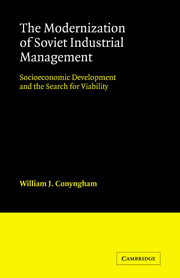 The Modernization of Soviet Industrial Management
The Modernization of Soviet Industrial Management Published online by Cambridge University Press: 07 October 2011
The massive surge of enthusiasm among Soviet natural and social scientists in the 1960s for the application of cybernetic concepts to economic processes was rooted in the judgment that the economy had escaped control by traditional methods. As Loren Graham has noted, cybernetics rekindled the hope that these processes could be brought under rational control. By the end of the decade, there was a good deal of truth to the view that “cybernetics as a science, a methodology, a class of machines, and perhaps as magic word, has been the object of particular reverence and hope in the Soviet Union.” Through the 1970s, the cumulative costs of implementing a cybernetic approach to the rationalization of management has undoubtedly tempered this enthusiasm. The long-term consequences of the cybernetic approach, nonetheless, may have critical significance for the shape of industrial management because it has resulted in an intellectual as well as a technical revolution.
Systems as a logic of management
The value of the systems approach for the rationalization of management has been constrained to some degree by ideological pressure and serious methodological problems that have emerged with the development of the discipline. A central issue that has gripped Soviet as well as Western specialists has been to achieve a consensual definition of what constitutes the systems approach. For many, the large number of conflicting conceptions grouped under the label of systems analysis constitutes a methodological crisis of the first order, a crisis that arose initially in the problem of distinguishing general systems theory from cybernetics.
To save this book to your Kindle, first ensure [email protected] is added to your Approved Personal Document E-mail List under your Personal Document Settings on the Manage Your Content and Devices page of your Amazon account. Then enter the ‘name’ part of your Kindle email address below. Find out more about saving to your Kindle.
Note you can select to save to either the @free.kindle.com or @kindle.com variations. ‘@free.kindle.com’ emails are free but can only be saved to your device when it is connected to wi-fi. ‘@kindle.com’ emails can be delivered even when you are not connected to wi-fi, but note that service fees apply.
Find out more about the Kindle Personal Document Service.
To save content items to your account, please confirm that you agree to abide by our usage policies. If this is the first time you use this feature, you will be asked to authorise Cambridge Core to connect with your account. Find out more about saving content to Dropbox.
To save content items to your account, please confirm that you agree to abide by our usage policies. If this is the first time you use this feature, you will be asked to authorise Cambridge Core to connect with your account. Find out more about saving content to Google Drive.